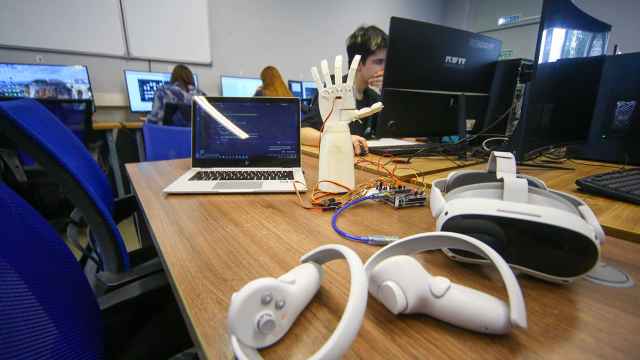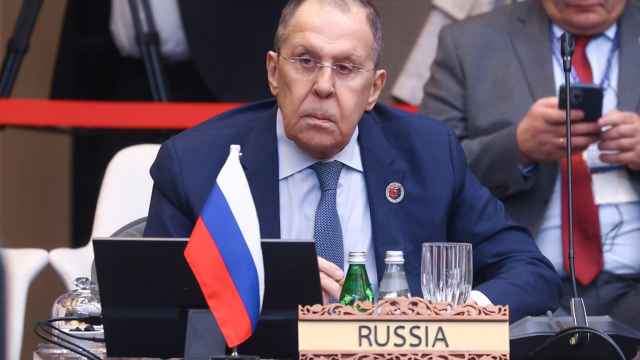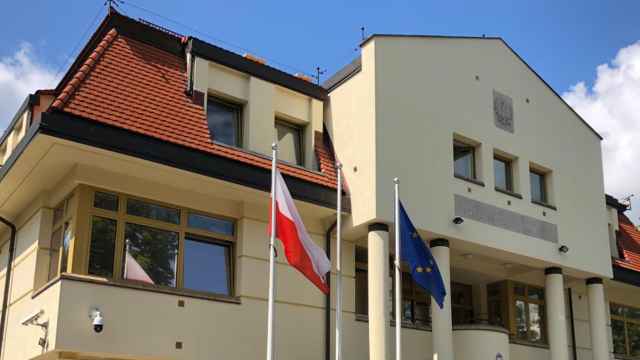The controversial bill levying hefty fines on protesters sailed through the Federation Council on Wednesday, bringing it close to President Vladimir Putin's desk and triggering an outcry from the opposition.
The bill jacks up fines from 2,000 rubles to 300,000 rubles ($9,000) for individuals and 1 million rubles for officials and organizations and has been attacked as draconian by rights activists, who on Wednesday appealed to Putin not to sign it.
Kremlin spokesman Dmitry Peskov said Wednesday that Putin would reject the bill only if it is found to contradict norms accepted in other European countries, Interfax reported.
Critics say the bill's seemingly hurried passage is motivated by the Kremlin's desire to have it in force before a large opposition march in Moscow planned for the June 12 holiday.
The upper house of parliament took just one hour to approve the draft law, voting 132-1 with one abstention, according to television reports. By contrast, the State Duma took more than 11 hours for approval Tuesday after opposition lawmakers bombarded the house with amendments.
The Federation Council's lone vote against came from Chukotka Senator Larisa Ponomaryova, said her son, A Just Russia Duma Deputy Ilya Ponomaryov, in a post on Twitter.
A total of 32 of the 166 senators did not participate in the vote, including Lyudmila Narusova, who provoked a rare public clash with Council Speaker Valentina Matviyenko, when she complained that the law's hurried adoption harms the Federation Council's image, turning it into a "rubber stamp" machine.
"We only once displayed such haste before: when we decided to send troops," she said in televised comments, referring to the 2008 war over South Ossetia.
A visibly irritated Matviyenko told Narusova to speak without "unnecessary boastfulness and insult" and reminded her that the bill had been debated in the Constitution and State Affairs Committee.
"You had the chance to actively participate in discussing this draft law, if you had been interested," she said dryly.
A senator for the Bryansk region, Narusova is the widow of former St. Petersburg Mayor Anatoly Sobchak, who was Putin's mentor. Her daughter, television host Ksenia Sobchak, has become a prominent opposition supporter.
Made up entirely of regional governors' and parliaments' appointees, the Federation Council has long been seen as a sinecure for fallen officials and wealthy businessmen who trade loyalty to the Kremlin for safety from prosecution. The vote prompted scathing remarks about the upper house's democratic culture.
"Listening to senators — man, their backwardness is worse than in the Duma," Kommersant reporter Maxim Ivanov on Twitter.
On Tuesday, the Duma saw a dramatic 11-hour marathon that lasted until midnight, when the lower house approved the bill 241-147 in the final third reading.
During the hours of debate, opposition lawmakers tried to prevent or at least slow down the bill's adoption by filing an unprecedented 430 amendments.
United Russia, which has a 236-seat majority in the 450-member house, got the bill passed after Duma Speaker Sergei Naryshkin limited each amendment's hearing time to 30 seconds and later to just 15 seconds, Interfax reported.
Deputies from A Just Russia walked out after the second reading, during which party leader Sergei Mironov said the bill was "a spit in the people's face." Ponomaryov said the party would ask the Constitutional Court to repeal the law.
"We created an important precedent by making the Duma adopt this law in violation of the rules," he told Interfax.
Naryshkin denied the accusations Wednesday. "By carefully following regulations, we managed to debate and to adopt even such a difficult law despite all political disagreements," he was quoted as saying by Interfax.
Veteran human rights campaigner Lyudmila Alexeyeva on Wednesday an open letter to the president in which she warned that the bill "not only contradicts the Constitution, but also defies legal principles."
The head of the presidential human rights council, Mikhail Fedotov, also said he would write to Putin and warned that the bill will lead to deepening social conflict, Interfax reported.
He was echoed by Ilya Yashin from the Solidarity opposition group, who said that activists would simply ignore it.
"They will just go out to protest without leaders and coordinate on social networks," he said on NTV television.
Former Finance Minister Alexei Kudrin, who has spoken out against the government since being fired last fall, the bill violates the constitutional right of assembly and urged a review.
Analysts said Wednesday that while Putin was likely to sign the bill so that it goes into effect before next Tuesday, this was not a necessity.
"The question of June 12 is not really important, because all decisions [about how to deal with the protesters] will be made on the police level," said Gleb Pavlovsky, the head of the Effective Politics Foundation.
Alexei Mukhin of the Center for Political Information, a think tank, said Putin might wait a little to let Kremlin lawyers study the bill.
"But then he will sign and point out that it is in line with European legislation," Mukhin said.
A Message from The Moscow Times:
Dear readers,
We are facing unprecedented challenges. Russia's Prosecutor General's Office has designated The Moscow Times as an "undesirable" organization, criminalizing our work and putting our staff at risk of prosecution. This follows our earlier unjust labeling as a "foreign agent."
These actions are direct attempts to silence independent journalism in Russia. The authorities claim our work "discredits the decisions of the Russian leadership." We see things differently: we strive to provide accurate, unbiased reporting on Russia.
We, the journalists of The Moscow Times, refuse to be silenced. But to continue our work, we need your help.
Your support, no matter how small, makes a world of difference. If you can, please support us monthly starting from just $2. It's quick to set up, and every contribution makes a significant impact.
By supporting The Moscow Times, you're defending open, independent journalism in the face of repression. Thank you for standing with us.
Remind me later.






